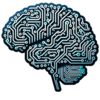خطر وجودی ناشی از هوش جامع مصنوعی - ویکیپدیا، دانشنامهٔ آزاد
| بخشی از مقالهها درباره |
| هوش مصنوعی |
|---|
خطر وجودی ناشی از هوش جامع مصنوعی (انگلیسی: Existential risk from artificial general intelligence) یک فرضیه است که پیشرفت قابل توجه در هوش عمومی مصنوعی (AGI) میتواند منجر به انقراض انسان یا برخی فاجعه جهانی غیرقابل جبران شود.[۱][۲]
مکتب خطر وجودی ("x-risk") به شرح زیر استدلال میکند: گونه انسان در حال حاضر بر گونههای دیگر تسلط دارد زیرا مغز انسان دارای برخی قابلیتهای متمایز است که سایر حیوانات به صورت عمومی فاقد آن هستند. اگر هوش مصنوعی از نظر هوش عمومی بتواند از بشریت پیشی بگیرد و به «فوق هوشمند» تبدیل شود، آنگاه کنترل آن برای انسان دشوار یا غیرممکن خواهد بود. همانطور که سرنوشت گوریل کوهی به حسن نیت انسان بستگی دارد، سرنوشت بشریت نیز ممکن است به برخی اقدامات یک ابرهوش ماشینی در آینده بستگی داشته باشد.
احتمال وقوع این نوع سناریو به شکل زیادی مورد بحث و گفتگو قرار گرفتهاست، و تا مقدار زیادی به سناریوهای مختلف برای پیشرفت آینده در علوم رایانه بستگی دارد. نگرانیهایی در مورد ابر هوش توسط دانشمندان برجسته رایانه و مدیران عامل فناوری مانند جفری هینتون،[۳] آلن تورینگ، [الف] ایلان ماسک،[۶] و مدیر عامل OpenAI سم آلتمن ابراز شدهاست.[۷] در سال ۲۰۲۲، یک نظرسنجی از محققان هوش مصنوعی نشان داد که برخی از محققان بر این باورند که احتمال ۱۰ درصد یا بیشتر وجود دارد که ناتوانی ما در کنترل هوش مصنوعی باعث یک فاجعه وجودی شود.[۸][۹]
تاریخ
[ویرایش]یکی از اولین نویسندگانی که نگرانی جدی خود را از اینکه ماشینهای بسیار پیشرفته ممکن است خطرات وجودی برای بشریت ایجاد کنند، ابراز کرد، رماننویس ساموئل باتلر بود که در مقالهاش در سال ۱۸۶۳ داروین در میان ماشینها موارد زیر را نوشت:[۱۰]
جستارهای وابسته
[ویرایش]یادداشت
[ویرایش]- ↑ In a 1951 lecture[۴] Turing argued that “It seems probable that once the machine thinking method had started, it would not take long to outstrip our feeble powers. There would be no question of the machines dying, and they would be able to converse with each other to sharpen their wits. At some stage therefore we should have to expect the machines to take control, in the way that is mentioned in Samuel Butler’s Erewhon. ” Also in a lecture broadcast on BBC[۵] expressed: "If a machine can think, it might think more intelligently than we do, and then where should we be? Even if we could keep the machines in a subservient position, for instance by turning off the power at strategic moments, we should, as a species, feel greatly humbled. . . . This new danger . . . is certainly something which can give us anxiety. ”
منابع
[ویرایش]- ↑ Bostrom, Nick (2002). "Existential risks". Journal of Evolution and Technology. 9 (1): 1–31.
- ↑ Turchin, Alexey; Denkenberger, David (2018-05-03). "Classification of global catastrophic risks connected with artificial intelligence". AI & Society. 35 (1): 147–163. doi:10.1007/s00146-018-0845-5. ISSN 0951-5666.
- ↑ ""Godfather of artificial intelligence" weighs in on the past and potential of AI". www.cbsnews.com (به انگلیسی). Retrieved 2023-04-10.
- ↑ Turing, Alan (1951). Intelligent machinery, a heretical theory (Speech). Lecture given to '51 Society'. Manchester: The Turing Digital Archive. Archived from the original on September 26, 2022. Retrieved 2022-07-22.
- ↑ Turing, Alan (15 May 1951). "Can digital computers think?". Automatic Calculating Machines. Episode 2. Can digital computers think?. BBC.
- ↑ Parkin, Simon (14 June 2015). "Science fiction no more? Channel 4's Humans and our rogue AI obsessions". The Guardian (به انگلیسی). Archived from the original on 5 February 2018. Retrieved 5 February 2018.
- ↑ Jackson, Sarah. "The CEO of the company behind AI chatbot ChatGPT says the worst-case scenario for artificial intelligence is 'lights out for all of us'". Business Insider (به انگلیسی). Retrieved 2023-04-10.
- ↑ "The AI Dilemma". www.humanetech.com (به انگلیسی). Retrieved 2023-04-10.
- ↑ "2022 Expert Survey on Progress in AI". AI Impacts (به انگلیسی). 2022-08-04. Retrieved 2023-04-10.
- ↑ Breuer, Hans-Peter. 'Samuel Butler's "the Book of the Machines" and the Argument from Design.' بایگانیشده در ۱۵ مارس ۲۰۲۳ توسط Wayback Machine Modern Philology, Vol. 72, No. 4 (May 1975), pp. 365–383


 French
French Deutsch
Deutsch